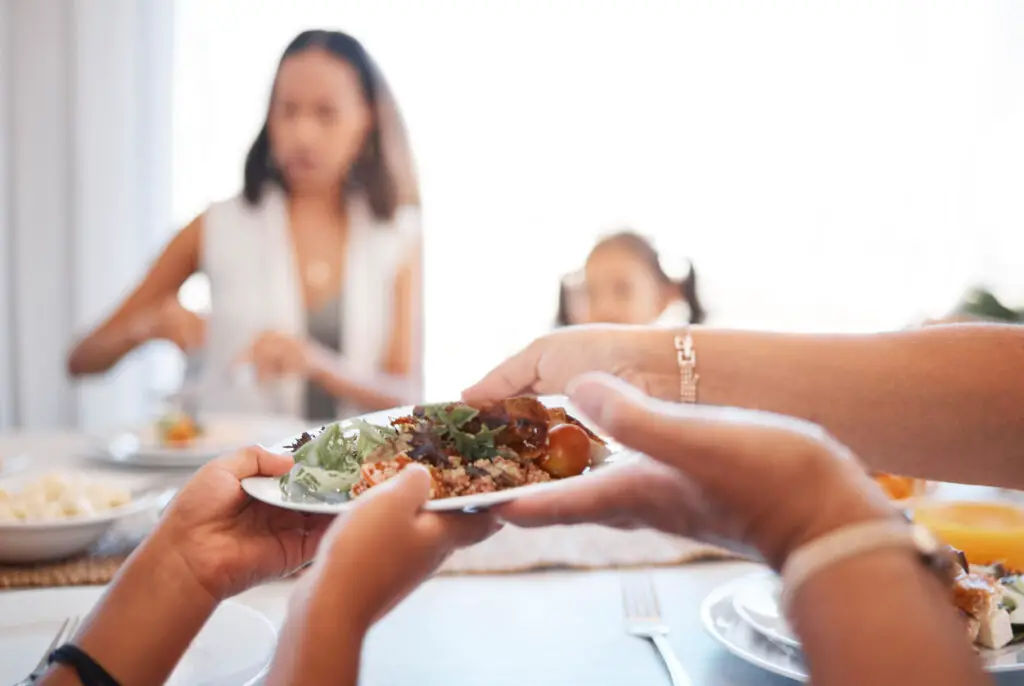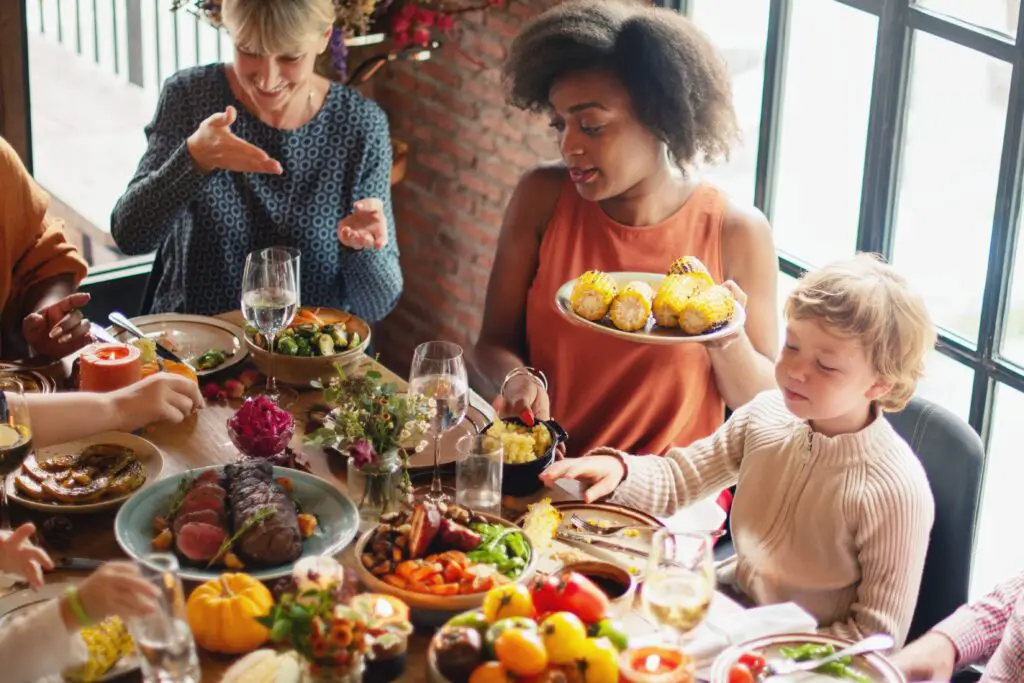1. Food is Love, But It’s Also an Event

In the South, food is more than just nourishment—it’s a cultural cornerstone, a form of art, and an expression of love, according to NPR. Meals are often seen as an occasion, not a simple necessity, with family and friends gathering together to share food and stories. When a Southerner invites you over, expect a spread that could feed an army. Fried chicken, cornbread, mashed potatoes, collard greens, and pecan pie are just the beginning of the menu. There’s something comforting about the familiarity of these dishes, and they aren’t just about eating—they’re about experience. Southern meals are long and leisurely affairs, where time is set aside for conversation, laughter, and reflection. It’s not unusual for someone to say, “We’ll make a plate for you,” even if you’ve missed dinner because the idea of leaving someone hungry is unthinkable. Even after a hearty meal, it’s expected that you at least try everything, whether or not you’re still full. It’s a sign of respect and appreciation for the effort put into preparing the meal. Food in the South is a symbol of care, and it’s not just about filling up—it’s about savoring the moment and bonding over shared experiences.
But the love for food also comes with a side of competition. In many Southern families, there’s an unspoken rivalry when it comes to cooking. Every grandmother or aunt will tell you that their version of a dish is the “real” one, and they’re often quick to critique a new recipe that doesn’t quite measure up. This competitive spirit extends to holiday meals and family reunions, where everyone’s looking to impress, but also to uphold tradition. There’s a hierarchy that exists around Southern cooking, and it’s not uncommon for family members to argue over who makes the best biscuits or fried chicken. The pressure to be polite and rave about the food, no matter how full or carb-loaded you are, is a subtle but powerful force. You’ll quickly learn that it’s not just about the food itself, but the ritual of sharing it, the pride in preparing it, and the community that forms around it. And while food is an expression of love, it’s also a deep part of Southern culture, representing hospitality, family, and tradition in its most delicious form.
2. The Porch is the Heart of the Home

In Southern culture, the porch is so much more than just an outdoor seating area—it’s the very heart of the home. It serves as an extension of the living room, but it also becomes a space for socializing, relaxing, and reflecting on the day. The porch is where Southerners gather to enjoy the cooling evening air, sip sweet tea, and catch up with neighbors and friends. It’s a place where time seems to slow down, and the fast pace of life can be put on pause for a while. The importance of the porch cannot be overstated; it represents the very essence of Southern hospitality. On a hot day, people can be found relaxing in rocking chairs, enjoying the breeze, and exchanging stories. The porch also symbolizes the welcoming nature of Southern communities, where everyone is invited to drop by and chat. If you’re sitting on the porch, you’re likely to have visitors who will stop by just to say hello, share gossip, or talk about local events. In a sense, the porch is a stage for daily life, where the rhythm of the world around you can be observed and experienced at a comfortable pace, The Bitter Southerner blog shares.
The porch is also a sanctuary from the heat, offering a place to escape the sweltering humidity of summer. It’s where you’ll spend the evening after a busy day, looking out over the yard or street while you relax and unwind. The slower pace of life that is characteristic of the South is perfectly embodied on the porch, where people take the time to slow down and enjoy each other’s company. In many ways, the porch becomes an integral part of the Southern lifestyle—nearly as important as the house itself. It’s often decorated with welcoming touches like hanging plants, a wreath on the door, and comfortable seating that encourages relaxation. It’s not uncommon for families to spend hours sitting on the porch, whether chatting or simply watching the sunset. It’s a space for making memories, whether those moments involve deep conversations, casual banter, or simply soaking up the serenity of the environment. The porch serves as a symbol of the relaxed, open-hearted nature of Southern living, where people slow down, connect, and create lasting bonds.
3. The Accent is as Much a Part of You as Your Name

In the South, the accent isn’t just a way of speaking—it’s a badge of pride and identity that runs deep in the region’s culture. The Southern drawl, with its distinctive lilt, tells a story of generations past and serves as a connection to the South’s history and traditions. Phrases like “y’all” and “bless your heart” aren’t just common expressions; they’re woven into the fabric of everyday life. VICE wrote an article about how an accent is an integral part of a person’s identity. From “fixin’ to” (getting ready to) to using “coke” as a general term for any soda, the Southern accent shapes how people view one another and even the values they hold dear. It’s part of what makes Southerners who they are—warm, approachable, and proud of their heritage. Many Southerners will tell you that their accent is as much a part of their identity as their family name. Over time, these speech patterns have become symbolic of the South itself, a region known for its hospitality, charm, and genuine kindness. Even those who were not born in the South find themselves picking up a few Southern sayings once they’ve spent enough time in the region.
The Southern accent also serves as a subtle marker of where you’re from and what kind of life you lead. In a place like the South, the way you speak often ties you to a specific community, revealing whether you’re from the city or a rural area, and which part of the state you call home. It’s a reminder that accents are more than just ways of speaking—they’re indicative of a person’s roots, their family history, and the values they carry with them. Despite its casual nature, the Southern accent also exudes a sense of pride. Southerners may tease each other good-naturedly about their speech, but deep down, the accent is something they hold dear. It’s not uncommon for someone from the South to take offense if their accent is mocked or imitated. But at the same time, the Southern accent is a source of warmth and familiarity—it makes people feel like they belong. Whether you’ve lived in the South all your life or just visited, the accent is likely to make you feel at home, like a friendly embrace in verbal form.
4. Southern Manners Are Non-Negotiable

Southern manners are not just a set of rules; they’re an ingrained way of life that emphasizes respect, kindness, and community. From the moment you step into a Southern home, you’ll notice that polite behavior isn’t optional—it’s expected. Saying “please” and “thank you” is just the beginning; holding doors open, addressing elders as “sir” or “ma’am,” and offering a helping hand are all part of the code. These customs are taught from a young age and are seen as essential elements of Southern hospitality. There are so many that Southern Living has taken care of listing them. Southern manners go beyond simple politeness—they are rooted in a deep respect for others and the importance of making people feel valued. In the South, a person’s character is often judged by the way they treat others, and good manners are seen as a reflection of that character. This cultural expectation shapes the way Southerners interact with the world around them and is often viewed as a mark of Southern charm.
However, Southern manners also have a unique twist that may be unfamiliar to outsiders. Phrases like “bless your heart” are a perfect example—while it can express genuine sympathy or kindness, it can also be used in a more playful or even sarcastic way. The key to understanding Southern manners is to realize that they aren’t rigid or formal—they’re fluid and adaptable, reflecting the warmth and flexibility that Southern culture is known for. Offering someone a plate of food isn’t just about feeding them—it’s about offering comfort and showing care. If a neighbor is going through a tough time, you might drop by with a homemade casserole, not just to help but as a sign of solidarity. There’s an unspoken expectation that everyone looks out for each other, and manners are one of the primary ways this is done. From the way you speak to the way you act, Southern manners convey a message of kindness, respect, and community that is as much a part of life as the weather itself.
5. “Bless Your Heart” Has Many Meanings

“Bless your heart” is one of those iconic Southern phrases that takes on a different meaning depending on the tone, context, and situation. On the surface, it seems like a simple expression of sympathy or care, but in reality, it can mean much more. For example, if someone trips or makes a mistake, a kind-hearted Southerner might say, “Bless your heart” in a gentle, comforting tone, showing empathy. This is the Southern way of expressing kindness and offering solace without making a big deal out of it. It’s a phrase that signals you care about someone’s well-being, even in minor, everyday situations. It can be a sincere acknowledgment of their discomfort or an understanding of their predicament.
On the other hand, if someone is acting clueless or doing something foolish, “bless your heart” can be a subtly sarcastic way of pointing out their lack of understanding. The tone shifts, and it’s clear that the phrase isn’t a compliment—it’s more of a gentle, yet humorous, commentary on the person’s behavior. In these cases, the phrase carries a bit of a sting, though still wrapped in the soft charm of Southern politeness. “Bless your heart” can be a multi-layered phrase that conveys everything from deep sympathy to playful mockery, depending on the speaker’s mood. Understanding how to interpret the meaning of “bless your heart” is a crucial part of mastering Southern communication. There are many ways to respond to this complex phrase, as Souther Living explains, and picking the right answer is crucial. It’s one of those expressions that, when used correctly, can show affection, humor, or understanding, but if used incorrectly, could leave you feeling a little unsure of the intent behind the words.
6. Southerners are Fiercely Loyal to Their Local Football Team

In a Southern household, football is not just a sport—it’s a way of life. No matter where you are in the South, there’s a good chance that the household you’re in is rooted in a specific team. Whether it’s college football or the NFL, the level of loyalty and passion for one’s team is unmatched. Rivalries run deep—there’s no neutral ground, and Sunday game days become full family events. From tailgates to intense watch parties, the whole house gets swept up in the spirit.
What makes it especially unique is the level of pride that goes into supporting your team. In many Southern homes, everyone has their own collection of team gear: jerseys, hats, and flags that fill the home and the yard. You might even find that personal schedules revolve around game times. Missing a game can feel like missing out on an important family tradition. Whether it’s game day excitement or the occasional heartbreak after a loss, football brings the family together and gives Southerners a shared experience they can talk about for the rest of the week.
7. You Will Know the Neighbors—Well, You’ll Know Everybody

In the South, it’s not unusual for people to know everyone in the neighborhood—and their business too. The idea of “keeping up with the Joneses” takes on a literal meaning here, as neighbors are often more like extended family. Whether it’s a casual chat across the fence or a full-fledged block party, there’s always a reason to stop and chat. Southern hospitality makes it almost impossible for people to stay strangers for long.
Neighbors aren’t just acquaintances—they often become close friends or even surrogate family members. This is part of the Southern charm and the emphasis on close-knit communities. Expect to get invited to family events, brought baked goods during tough times, or have someone drop by just to check in. It’s common to share your day with the person next door. And if you’re new to the area? Don’t worry, they’ll make sure you’re welcomed with open arms.
8. Sundays Aren’t Just for Church—They’re for Family

For many Southern families, Sunday isn’t just about religion—it’s about tradition and family time. After church, families gather for a big Sunday meal, often the highlight of the week. This meal is usually a multi-course affair where everyone is expected to come, eat, and enjoy themselves. It’s a time to reconnect with loved ones, talk about the week, and most importantly, eat some comfort food. And yes, this meal might include everything from fried chicken to mashed potatoes, corn pudding, and pie for dessert.
But Sunday gatherings aren’t limited to just food—they’re about community. You’ll often see families spending the entire afternoon together, whether that means sitting on the porch, watching football, or even playing a game of dominoes. The social importance of Sunday is immeasurable, and it’s a tradition that’s passed down through generations. Growing up in a Southern household means Sunday meals and visits are something you’ll look forward to—and sometimes dread if the house is getting too crowded.
9. Guilt and Guilt-Free Guilt Trips Are Common

One of the stranger realities of living in a Southern household is the presence of guilt—sometimes it’s intentional, but sometimes it’s not. It’s not uncommon for Southerners to lay on the guilt trip in a way that sounds polite and even affectionate, but is designed to make you feel just a little bit bad. If you’ve ever heard a relative say, “Well, we sure would’ve liked to see you, but I guess you had better things to do,” you’ve experienced the art of a guilt trip.
However, it’s not malicious—it’s just a way of making sure people stay close. Southerners use guilt as a means of showing they care. They want you to feel missed, loved, and important enough to be a part of the family’s events and traditions. And don’t be surprised if your mom or grandmother goes on a well-meaning rant about how you never call enough. It’s not meant to make you feel bad—it’s their way of saying they love you and want to keep you close.
10. It’s Not Really Hot, It’s Just the Humidity

One of the first things you’ll notice when living in a Southern household is the weather. While many parts of the country deal with cold or dry conditions, the South is known for its long, humid summers. You might hear someone say, “It’s not the heat, it’s the humidity,” and they aren’t kidding. The combination of high temperatures and thick, sticky air makes it feel a lot hotter than it might actually be.
In fact, many Southerners will tell you that they’ve learned to live with the humidity rather than battle it. You’ll quickly realize that everything is either air-conditioned or requires a fan, and you’ll become very well-acquainted with the cooling effects of iced tea and fans. Summer days in a Southern household can involve a lot of sweating, but also a lot of refreshing, cool drinks and slow-paced activities to avoid the worst of the heat.
11. Sunday Drives Are More Than Just a Drive

In the South, a “Sunday drive” isn’t just an excuse to go for a leisurely car ride. It’s a long-held tradition that allows families to explore the countryside, visit relatives, or simply take in the scenery. This tradition isn’t reserved for just any day of the week; Sundays are considered the perfect time for such a journey, especially after a big meal. It’s a relaxing way to unwind, chat, and bond without the hustle and bustle of everyday life.
The Sunday drive can also serve as a form of family tourism. Even if you’ve lived in the area your whole life, a Sunday drive will take you through old towns, winding country roads, or even nearby lakes and forests you never noticed before. It’s a wonderful way to experience the quieter, more picturesque parts of Southern life and bond with the family. And yes, it’s often accompanied by the soundtrack of country or gospel music playing on the car radio.
12. The Church Community Becomes Your Extended Family

If you’re living in a Southern household, chances are, your family is deeply tied to their church. It’s not just a place to worship—it’s a gathering spot for the entire community. Church services in the South often have a sense of ritual that can bring people closer together. Expect your Sunday mornings to be spent in a pew, and afterwards, there’s usually some kind of social event or gathering that keeps the conversations flowing.
Church becomes a place where families find support, celebrate milestones, and create lasting relationships. You might have potlucks, fundraisers, or even church picnics. The church community feels like an extended family, and when life’s challenges come, it’s this group of people that rallies around you. Whether it’s a prayer, a casserole, or just a listening ear, the bond formed in church is considered unbreakable in Southern life.
13. Sweet Tea Is Not Just a Drink—It’s a Way of Life

Sweet tea is perhaps one of the most iconic Southern staples, and it’s far more than just a refreshing beverage. It’s almost like a cultural symbol of the South itself. Southerners take their tea seriously, brewing it from scratch with plenty of sugar to create that perfect balance of sweet refreshment. You’ll often see a large pitcher of it sitting on the table, ready to be poured into a glass filled with ice and garnished with lemon.
But sweet tea isn’t something you drink just on special occasions; it’s something that’s consumed regularly—almost obsessively. It’s served with every meal, and when guests arrive, it’s expected to be offered with a smile. The importance of sweet tea goes beyond taste—it’s about hospitality, tradition, and an invitation to sit down and chat for hours. In a Southern household, sweet tea isn’t just a drink; it’s an invitation to slow down and savor the moment.


